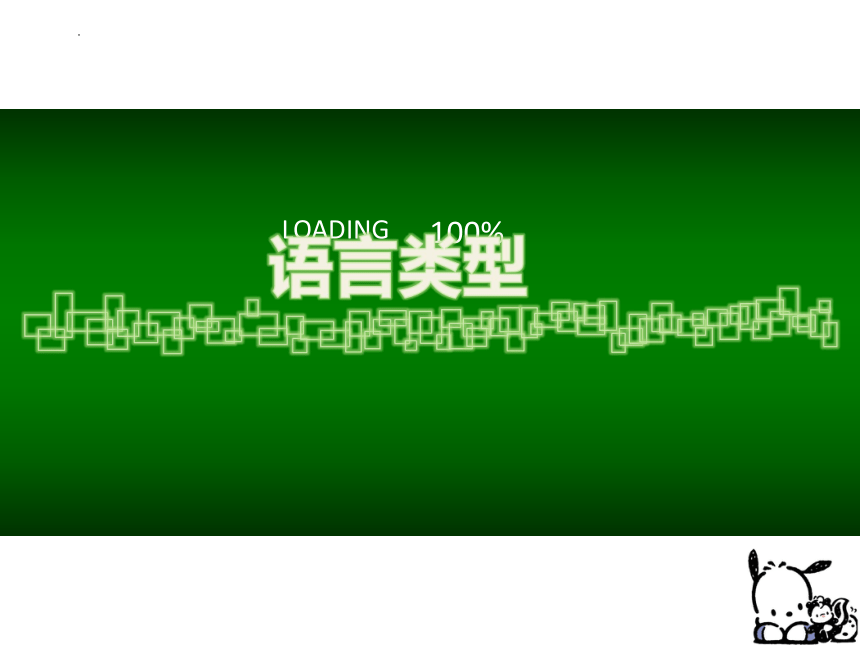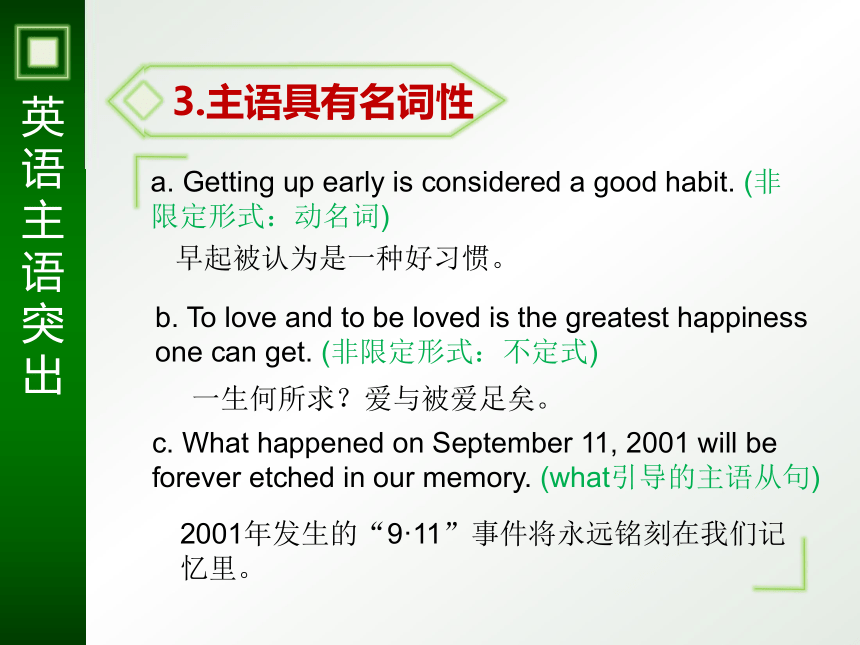2023-2024学年高中英语翻译中的英汉差异问题课件(共35张PPT)
文档属性
| 名称 | 2023-2024学年高中英语翻译中的英汉差异问题课件(共35张PPT) |  | |
| 格式 | pptx | ||
| 文件大小 | 757.7KB | ||
| 资源类型 | 教案 | ||
| 版本资源 | 通用版 | ||
| 科目 | 英语 | ||
| 更新时间 | 2023-08-20 14:22:39 | ||
图片预览












文档简介
(共35张PPT)
LOADING
1%
2%
3%
4%
5%
6%
7%
8%
9%
10%
11%
12%
13%
14%
15%
16%
17%
18%
19%
20%
21%
22%
23%
24%
25%
26%
27%
28%
29%
30%
31%
32%
33%
34%
35%
36%
37%
38%
39%
40%
41%
42%
43%
44%
45%
46%
47%
48%
49%
50%
51%
52%
53%
54%
55%
56%
57%
58%
59%
60%
61%
62%
63%
64%
65%
66%
67%
68%
69%
70%
71%
72%
73%
74%
75%
76%
77%
78%
79%
80%
81%
82%
83%
84%
85%
86%
87%
88%
89%
90%
100%
91%
92%
93%
94%
95%
96%
97%
98%
99%
LOADING
100%
语言类型
主语是谁?
语言类型
馒头他喂鹅了。
2.汉语:话题突出
3.确定主语
4.练习
1.英语:主语突出
2.汉语:话题突出
3.确定主语
4.练习
1.英语:主语突出
1.英语:主语突出
1.英语:主语突出
英语主语突出
英语主语突出
英语句子的主语和谓语要在人称和数上保持一致。鉴于主语在组织句子时很重要,我们可以说英语是主语突出的语言。英语主语主要有四种形式:施事主语、受事主语、形式主语和话题主语。
1.主谓一致
英语主语突出
英语的主语与谓语互相制约,主语和时间决定着谓语动词的表层形式。汉语句子里谓语不需要形态变化,翻译时就不必顾及人称和数这些范畴。
a. The president prepares to go to Shanghai by his special plane for a visit tomorrow.
总统准备明天乘坐专机前往上海参观访问。
b. All delegates prepare to go to Shanghai by his special plane for a visit tomorrow.
全体代表准备明天乘坐专机前往上海参观访问。
英语主语突出
2.主语不可或缺
1)除了祈使句和某些惯用语里的主语可以省略,英语的句子一般不能缺少主语;而且,即使没有实在的主语,也需要一个虚的主语(如it或there)。
a. There seems something wrong about it.
好像有点不大对劲。
b. It’s time we put egos aside and listened to the evidence!
现在就把自我感觉放一放,听听实际情况吧!
英语主语突出
2.主语不可或缺
2)以汉语为母语的说话者有隐匿主体的倾向,汉语句子不一定要有主语,无主句和省略主语的句子很常见。
c. 2020年就提出政治体制改革,但没有具体化,现在应该提到日程上来。
Early in 2020 it was suggested that we reform the political structure, but no concrete measures to do so were worked out. Now it is time for us to place political reform on the agenda.
英语主语突出
3.主语具有名词性
英语中出现在主语位置的句子成分必须具有名词性特性。因此,其他此类若要出现在主语位置,就需要作一些形式上的变化。比如,代词做主语要用主格形式,动词短语做主语时要用非限定形式。
英语主语突出
3.主语具有名词性
a. Getting up early is considered a good habit. (非限定形式:动名词)
早起被认为是一种好习惯。
b. To love and to be loved is the greatest happiness one can get. (非限定形式:不定式)
一生何所求?爱与被爱足矣。
c. What happened on September 11, 2001 will be forever etched in our memory. (what引导的主语从句)
2001年发生的“9·11”事件将永远铭刻在我们记忆里。
英语主语突出
4.用物和事做主语
英语常用物做主语,汉语常用人做主语。
a. The thought of it terrified me.
c. It occurred to him to leave the whole thing to his wife.
他想把这桩事全部交由妻子打理。
想到这我就后怕。
b. Words failed me.
我说不出话来。
2.汉语话题突出
汉语话题突出
汉语话题突出
在汉语里,出现在小句动词之前的成分既可以是英语那样的主语,又可以是话题。任何事物都可以成为话题。话题不是主谓宾那样的语法成分,而是说话人陈述和说明的对象。如果一个句子有话题,其他部分就是说明,负责对话体进行描述、说明或评估。汉语里能做话题的成分比较灵活,可以是词、短语或小句,这些灵活的话题句会给汉译英带来困难。
3.确定主语
确定主语
增补主语
确定主语
1)汉语中的一些格言警句、劝告或告示不用主语,英译时需要增补表达泛指意义的人称代词或名词,如one, people, you, things等。
a. 不到长城非好汉。
He who has never been to the Great Wall is not a true man.
b. 最好等明天再谈罢。
The best thing would be for you to come again tomorrow.
增补主语
确定主语
2)汉语中有些主语不言自明(如交际中的“你”和“我”),有些主语是谈话的中心话题,这些主语可以不出现在语言表层。但英语不同,英语语法要求句子必须有主语。因此,英译时要根据上下文补上主语。
a. 去哪儿出差了?
Where did you go on business
b.腐败的事情,一抓就能抓到重要的案件,就是我们往往下不去手。
We can always uncover major cases of corruption if we want to. The problem is that we are usually hesitant about handing such cases.
增补主语
确定主语
3)增补形式主语it
a. 怕是要下雪了。
I am afraid it’s going to snow.
b. 这儿离学校很远。
It’s a long way to go from here to school.
汉语在描述气候、天气、温度或时间、地点、距离时
增补主语
确定主语
3)增补形式主语it
c. 活到老,学到老。
It’s never too old to learn.
d. 有朋自远方来,不亦乐乎。
It is a great pleasure to meet friends from afar.
汉语表达观点、态度、要求、告诫时
增补主语
确定主语
3)增补形式主语it
e.人们常说,见到流星许个愿,愿望就会实现。
It is said that if you make a wish when you see a meteor in the sky your wish will be realized.
有“据称”、“据报道”、“有人认为”、“人们常说”等句子时,常用“It + is/was + V-ed that…”句型
汉语有时用动词或小句作话题时
f. 安装地下电子装置要耗费1,000万美元。
It would cost $10 million installing the electronic units in the ground.
增补主语
确定主语
3)增补形式主语it
g. 重要的不是谁统治我们,而是看他怎样统治。
It is not who rules us that is important, but how he rules us.
汉语强调结构“是+被强调部分”时,可考虑用“It + is/was +被强调部分+ that/who从句”句型
增补主语
确定主语
4)增补虚位主语there
a. 那里站着一个穿制服的人。
There stood a man in uniform.
在汉语里,时间、地点短语可以用于句首充当话题,而说明部分使用表达存在或出现意义的状态动词,译成英语时,可以使用there be句型。
b.统治集团内部发生了分裂.
There was a split in the ruling group.
重新确定主语
确定主语
1)英语中名词占优势,汉语中动词占优势
a. 一看到这条河,我便想起了我的故乡。
The sight of the river reminds me of my hometown.
b. 你瞧,我要是一天看不见你,我心里就发慌。
One day without you drives me frantic!
c. 儿子考试不及格,他非常生气,结果就和妻子吵了起来。
His anger over the boy’s failure in the exam led him to quarrel with his wife.
重新确定主语
确定主语
2)转换施事主语
汉语主语:人或有生命的名词
英语主语:抽象名词
a. He loved her so much that the slightest thought of her sadness weighed heavily upon his heart.
他很爱她。一念到她悲伤,他就心情沉重。
b. A new dignity crept into his walk.
他走起路来,不知不觉地添了几分尊严。
重新确定主语
确定主语
3)时间或处所名词作主语
英语里常见到一些没有意志力的时间名词和一些表意动能力的动词(如:find,see,witness等)组合做主语。
a.经济发展比较慢的是2020年至2023年。
The years from 2020 to 2023 witnessed comparatively slow economic growth.
b. 这间卧室可以睡三个人。
This bedroom can sleep three people.
重新确定主语
确定主语
4)根据上下文意义另选主语,避免翻译腔。
a.他这种人小王是绝不会嫁的。
The last person Xiao Wang wants to marry is him.
b. 阿成,你这些什么话!
I’m surprised at you, Wei-cheng!.
c. 他那半肢疯,半个身子简直不能动。
Of course, being paralysed like that, he can hardly move a muscle.
重新确定主语
确定主语
5)英语虽然强烈倾向于让主语占据句子开始的位置,但其他成分也可以放在句首,起强调作用。汉译时可以考虑保留源语中出现在句首的成分。
a. Why I did this I cannot say.
为什么这么做,我可不能说。
b. How he got in I do not know.
他怎么进去的,我不知道。
c. This I could never have anticipated.
这我可真没想到。
重新确定主语
确定主语
英译汉时,先弄清原文句子中的主语类型——人称主语还是物称主语、真实主语还是形式主语,然后确定它在译文句子中的表现形式,根据汉语的语言习惯和表达方式灵活处理。可以考虑省略或隐含源语里的主语,或改换人称主语,或根据句子的语义结构和信息分布情况做话题化处理 。
d. Where there is a will, there is a way.
有志者事竟成。
e. I’d like to say a few words about reading.
读书这个问题,我想说几句。
4.练习
4.练习
练习
练习·汉译英
5、这样来制定方针政策,就能统一全党思想,达到新的团结。
6、希望在不久的将来,宗谱能在其发祥地中国大陆复兴起来。
7、广场上矗立着一座纪念碑。
Formulating principles and policies in this way enables us to unify the thinking of the whole Party so as to achieve a new unity.
It is hoped that, before long, clan genealogy would be revived in its place of origin—China’s mainland .
There stands a monument in the square.
练习·英译汉
请提供水果罐头的最低报价。
1. You are kindly requested to let us have your best quotation for the canned fruits.
4. When you were born, you cried and the world rejoiced. Live your life so that when you die, the world cries and you rejoice.
3. What bothered me most was that my eating was so out of control.
2. It took me a long time to get around to it.
我费了不少功夫才做成这件事。
我特心烦,吃饭没有饱的时候。
呱呱落地时,你哭世人笑;好好生活吧,等你老的那天,你笑世人哭。
练习·英译汉
人生一世,只要活出个滋味,一世足矣。
5. You only live once, but if you work it right, once is enough.
8. Taking a deep breath, in he went.
7. In the middle of all this, in walked Maggie.
6. We’re in a high gas price scenario for the winter.
我们正面临冬天汽油价格冲高的情势。
正在这个当儿,玛吉进来了。
他深深吸了一口气,走了进去。
THE END
LOADING
1%
2%
3%
4%
5%
6%
7%
8%
9%
10%
11%
12%
13%
14%
15%
16%
17%
18%
19%
20%
21%
22%
23%
24%
25%
26%
27%
28%
29%
30%
31%
32%
33%
34%
35%
36%
37%
38%
39%
40%
41%
42%
43%
44%
45%
46%
47%
48%
49%
50%
51%
52%
53%
54%
55%
56%
57%
58%
59%
60%
61%
62%
63%
64%
65%
66%
67%
68%
69%
70%
71%
72%
73%
74%
75%
76%
77%
78%
79%
80%
81%
82%
83%
84%
85%
86%
87%
88%
89%
90%
100%
91%
92%
93%
94%
95%
96%
97%
98%
99%
LOADING
100%
语言类型
主语是谁?
语言类型
馒头他喂鹅了。
2.汉语:话题突出
3.确定主语
4.练习
1.英语:主语突出
2.汉语:话题突出
3.确定主语
4.练习
1.英语:主语突出
1.英语:主语突出
1.英语:主语突出
英语主语突出
英语主语突出
英语句子的主语和谓语要在人称和数上保持一致。鉴于主语在组织句子时很重要,我们可以说英语是主语突出的语言。英语主语主要有四种形式:施事主语、受事主语、形式主语和话题主语。
1.主谓一致
英语主语突出
英语的主语与谓语互相制约,主语和时间决定着谓语动词的表层形式。汉语句子里谓语不需要形态变化,翻译时就不必顾及人称和数这些范畴。
a. The president prepares to go to Shanghai by his special plane for a visit tomorrow.
总统准备明天乘坐专机前往上海参观访问。
b. All delegates prepare to go to Shanghai by his special plane for a visit tomorrow.
全体代表准备明天乘坐专机前往上海参观访问。
英语主语突出
2.主语不可或缺
1)除了祈使句和某些惯用语里的主语可以省略,英语的句子一般不能缺少主语;而且,即使没有实在的主语,也需要一个虚的主语(如it或there)。
a. There seems something wrong about it.
好像有点不大对劲。
b. It’s time we put egos aside and listened to the evidence!
现在就把自我感觉放一放,听听实际情况吧!
英语主语突出
2.主语不可或缺
2)以汉语为母语的说话者有隐匿主体的倾向,汉语句子不一定要有主语,无主句和省略主语的句子很常见。
c. 2020年就提出政治体制改革,但没有具体化,现在应该提到日程上来。
Early in 2020 it was suggested that we reform the political structure, but no concrete measures to do so were worked out. Now it is time for us to place political reform on the agenda.
英语主语突出
3.主语具有名词性
英语中出现在主语位置的句子成分必须具有名词性特性。因此,其他此类若要出现在主语位置,就需要作一些形式上的变化。比如,代词做主语要用主格形式,动词短语做主语时要用非限定形式。
英语主语突出
3.主语具有名词性
a. Getting up early is considered a good habit. (非限定形式:动名词)
早起被认为是一种好习惯。
b. To love and to be loved is the greatest happiness one can get. (非限定形式:不定式)
一生何所求?爱与被爱足矣。
c. What happened on September 11, 2001 will be forever etched in our memory. (what引导的主语从句)
2001年发生的“9·11”事件将永远铭刻在我们记忆里。
英语主语突出
4.用物和事做主语
英语常用物做主语,汉语常用人做主语。
a. The thought of it terrified me.
c. It occurred to him to leave the whole thing to his wife.
他想把这桩事全部交由妻子打理。
想到这我就后怕。
b. Words failed me.
我说不出话来。
2.汉语话题突出
汉语话题突出
汉语话题突出
在汉语里,出现在小句动词之前的成分既可以是英语那样的主语,又可以是话题。任何事物都可以成为话题。话题不是主谓宾那样的语法成分,而是说话人陈述和说明的对象。如果一个句子有话题,其他部分就是说明,负责对话体进行描述、说明或评估。汉语里能做话题的成分比较灵活,可以是词、短语或小句,这些灵活的话题句会给汉译英带来困难。
3.确定主语
确定主语
增补主语
确定主语
1)汉语中的一些格言警句、劝告或告示不用主语,英译时需要增补表达泛指意义的人称代词或名词,如one, people, you, things等。
a. 不到长城非好汉。
He who has never been to the Great Wall is not a true man.
b. 最好等明天再谈罢。
The best thing would be for you to come again tomorrow.
增补主语
确定主语
2)汉语中有些主语不言自明(如交际中的“你”和“我”),有些主语是谈话的中心话题,这些主语可以不出现在语言表层。但英语不同,英语语法要求句子必须有主语。因此,英译时要根据上下文补上主语。
a. 去哪儿出差了?
Where did you go on business
b.腐败的事情,一抓就能抓到重要的案件,就是我们往往下不去手。
We can always uncover major cases of corruption if we want to. The problem is that we are usually hesitant about handing such cases.
增补主语
确定主语
3)增补形式主语it
a. 怕是要下雪了。
I am afraid it’s going to snow.
b. 这儿离学校很远。
It’s a long way to go from here to school.
汉语在描述气候、天气、温度或时间、地点、距离时
增补主语
确定主语
3)增补形式主语it
c. 活到老,学到老。
It’s never too old to learn.
d. 有朋自远方来,不亦乐乎。
It is a great pleasure to meet friends from afar.
汉语表达观点、态度、要求、告诫时
增补主语
确定主语
3)增补形式主语it
e.人们常说,见到流星许个愿,愿望就会实现。
It is said that if you make a wish when you see a meteor in the sky your wish will be realized.
有“据称”、“据报道”、“有人认为”、“人们常说”等句子时,常用“It + is/was + V-ed that…”句型
汉语有时用动词或小句作话题时
f. 安装地下电子装置要耗费1,000万美元。
It would cost $10 million installing the electronic units in the ground.
增补主语
确定主语
3)增补形式主语it
g. 重要的不是谁统治我们,而是看他怎样统治。
It is not who rules us that is important, but how he rules us.
汉语强调结构“是+被强调部分”时,可考虑用“It + is/was +被强调部分+ that/who从句”句型
增补主语
确定主语
4)增补虚位主语there
a. 那里站着一个穿制服的人。
There stood a man in uniform.
在汉语里,时间、地点短语可以用于句首充当话题,而说明部分使用表达存在或出现意义的状态动词,译成英语时,可以使用there be句型。
b.统治集团内部发生了分裂.
There was a split in the ruling group.
重新确定主语
确定主语
1)英语中名词占优势,汉语中动词占优势
a. 一看到这条河,我便想起了我的故乡。
The sight of the river reminds me of my hometown.
b. 你瞧,我要是一天看不见你,我心里就发慌。
One day without you drives me frantic!
c. 儿子考试不及格,他非常生气,结果就和妻子吵了起来。
His anger over the boy’s failure in the exam led him to quarrel with his wife.
重新确定主语
确定主语
2)转换施事主语
汉语主语:人或有生命的名词
英语主语:抽象名词
a. He loved her so much that the slightest thought of her sadness weighed heavily upon his heart.
他很爱她。一念到她悲伤,他就心情沉重。
b. A new dignity crept into his walk.
他走起路来,不知不觉地添了几分尊严。
重新确定主语
确定主语
3)时间或处所名词作主语
英语里常见到一些没有意志力的时间名词和一些表意动能力的动词(如:find,see,witness等)组合做主语。
a.经济发展比较慢的是2020年至2023年。
The years from 2020 to 2023 witnessed comparatively slow economic growth.
b. 这间卧室可以睡三个人。
This bedroom can sleep three people.
重新确定主语
确定主语
4)根据上下文意义另选主语,避免翻译腔。
a.他这种人小王是绝不会嫁的。
The last person Xiao Wang wants to marry is him.
b. 阿成,你这些什么话!
I’m surprised at you, Wei-cheng!.
c. 他那半肢疯,半个身子简直不能动。
Of course, being paralysed like that, he can hardly move a muscle.
重新确定主语
确定主语
5)英语虽然强烈倾向于让主语占据句子开始的位置,但其他成分也可以放在句首,起强调作用。汉译时可以考虑保留源语中出现在句首的成分。
a. Why I did this I cannot say.
为什么这么做,我可不能说。
b. How he got in I do not know.
他怎么进去的,我不知道。
c. This I could never have anticipated.
这我可真没想到。
重新确定主语
确定主语
英译汉时,先弄清原文句子中的主语类型——人称主语还是物称主语、真实主语还是形式主语,然后确定它在译文句子中的表现形式,根据汉语的语言习惯和表达方式灵活处理。可以考虑省略或隐含源语里的主语,或改换人称主语,或根据句子的语义结构和信息分布情况做话题化处理 。
d. Where there is a will, there is a way.
有志者事竟成。
e. I’d like to say a few words about reading.
读书这个问题,我想说几句。
4.练习
4.练习
练习
练习·汉译英
5、这样来制定方针政策,就能统一全党思想,达到新的团结。
6、希望在不久的将来,宗谱能在其发祥地中国大陆复兴起来。
7、广场上矗立着一座纪念碑。
Formulating principles and policies in this way enables us to unify the thinking of the whole Party so as to achieve a new unity.
It is hoped that, before long, clan genealogy would be revived in its place of origin—China’s mainland .
There stands a monument in the square.
练习·英译汉
请提供水果罐头的最低报价。
1. You are kindly requested to let us have your best quotation for the canned fruits.
4. When you were born, you cried and the world rejoiced. Live your life so that when you die, the world cries and you rejoice.
3. What bothered me most was that my eating was so out of control.
2. It took me a long time to get around to it.
我费了不少功夫才做成这件事。
我特心烦,吃饭没有饱的时候。
呱呱落地时,你哭世人笑;好好生活吧,等你老的那天,你笑世人哭。
练习·英译汉
人生一世,只要活出个滋味,一世足矣。
5. You only live once, but if you work it right, once is enough.
8. Taking a deep breath, in he went.
7. In the middle of all this, in walked Maggie.
6. We’re in a high gas price scenario for the winter.
我们正面临冬天汽油价格冲高的情势。
正在这个当儿,玛吉进来了。
他深深吸了一口气,走了进去。
THE END
